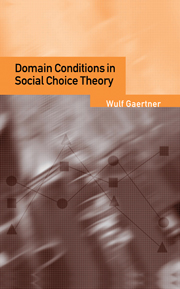Book contents
- Frontmatter
- Contents
- Preface and acknowledgements
- 1 Introduction
- 2 Notation, definitions and two fundamental theorems
- 3 The existence of collective choice rules under exclusion conditions for finite sets of discrete alternatives
- 4 Arrovian social welfare functions, nonmanipulable voting procedures and stable group decision functions
- 5 Restrictions on the distribution of individuals' preferences
- 6 The existence of social choice rules in n-dimensional continuous space
- 7 Concluding remarks
- References
- Author index
- Subject index
3 - The existence of collective choice rules under exclusion conditions for finite sets of discrete alternatives
Published online by Cambridge University Press: 02 December 2009
- Frontmatter
- Contents
- Preface and acknowledgements
- 1 Introduction
- 2 Notation, definitions and two fundamental theorems
- 3 The existence of collective choice rules under exclusion conditions for finite sets of discrete alternatives
- 4 Arrovian social welfare functions, nonmanipulable voting procedures and stable group decision functions
- 5 Restrictions on the distribution of individuals' preferences
- 6 The existence of social choice rules in n-dimensional continuous space
- 7 Concluding remarks
- References
- Author index
- Subject index
Summary
In this chapter we study various weakenings of the condition of unrestricted domain. In other words, we are looking for restrictions on individual preferences such that social preference relations with varying degrees of rationality exist (transitive, quasi-transitive or acyclical). A common feature of these restrictions is that either certain individual preference relations are totally excluded or particular individual preference relations are not allowed to occur in the presence of other relations. We shall say that an exclusion condition is sufficient for the existence of a social welfare function, for example, if whenever ε' ⊂ ε satisfies this condition for any N and any n-tuple (R1 …, Rn), the generated social relation is an ordering. Furthermore, an exclusion condition is said to be necessary if for all N and all n-tuples (R1 …, Rn) the social relation is an ordering only if ε' ⊂ ε satisfies this condition. In other words, whenever ε' ⊂ ε violates this condition, there is some set N and some n-tuple (R1, …, Rn) such that the ordering property does not hold. Inada (1969) emphasizes that the aim is to find maximal lists of individual orderings in the sense that any wider list may result in a violation of the ordering property.
- Type
- Chapter
- Information
- Domain Conditions in Social Choice Theory , pp. 17 - 45Publisher: Cambridge University PressPrint publication year: 2001



